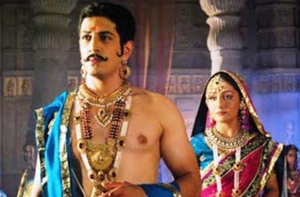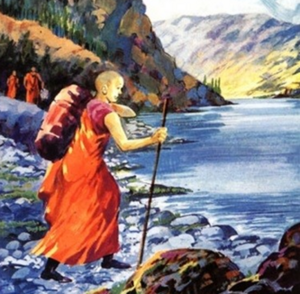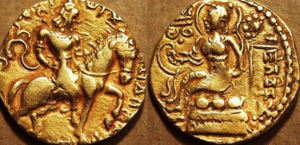Talk:Rājā Bhartṛhari and Samrāṭ Vikramāditya
By Vishal Agarwal
Rāja Bhartr̥hari was a noble ruler traditionally associated with the city of Ujjayinī in central India, though some accounts place his capital at Pāṭaliputra (modern Patna) in the east. Ujjayinī is renowned for the Mahākāleśvara Mandir, a prominent shrine dedicated to Śiva. The king was known as a devout bhakta of Śiva.
Pleased by his devotion, Devī Pārvatī is said to have appeared before him and presented him with a divine fruit, saying:
- “I am pleased with your bhakti. This fruit will restore your youth and grant you everlasting beauty and vigour.”
The king, filled with reverence, accepted the fruit with gratitude. As he prepared to consume it, he reflected,
- “I love my queen dearly. How could I remain youthful while she grows old? It would be better if I offered this fruit to her.”
He then presented the fruit to the queen, describing its miraculous properties. The queen received it with apparent affection and devotion, claiming she wished to fast and worship Śiva before eating it the next morning. In truth, she harboured affection for the military commander of the royal army. That night, she secretly summoned him and offered the fruit to him, explaining its divine power.
Unaware of her intentions, the commander himself was enamoured of one of the queen’s attendants and gifted the fruit to her. The attendant, in turn, offered it to a labourer she loved, and he passed it on to a poor woman who worked in the fields. Thus, within a single night, the divine fruit travelled through many hands, moving far from the palace by dawn.
Story: Rāja Bhartr̥hari’s Renunciation
The poor woman who had received the divine fruit reflected upon her good fortune and thought,
- “Our land is ruled by a noble and just king. For the welfare of Ujjayinī, I should present this fruit to Rāja Bhartr̥hari himself.”
The next day, she appeared in the royal court and humbly offered the fruit to the king, describing its miraculous properties. Upon seeing the same fruit he had given to his queen the previous night, Bhartr̥hari was stunned. He questioned the queen, who, overcome by fear, confessed the truth. The king soon learned how the fruit had passed from one person to another, revealing a chain of betrayal and misplaced affection.
Overwhelmed with sorrow and disillusionment, Bhartr̥hari pondered deeply:
- “All human relationships are transient and deceptive. People feign affection only to serve their own interests. I have lived amidst those I trusted and loved, yet all have deceived me. True faith and love can exist only when directed toward Bhagavān Śiva.”
Determined to renounce worldly life, Bhartr̥hari called his younger brother, Vikramāditya, and declared,
- “Brother, I have resolved to relinquish my throne and embrace the life of a sannyāsī. You shall now rule over Ujjayinī. I will spend the rest of my life in meditation and in search of a true Guru.”
Vikramāditya ascended the throne of Ujjayinī and later became celebrated as one of the greatest emperors in Hindu tradition. Bhartr̥hari, meanwhile, undertook extensive pilgrimages, visiting sacred sites such as Haridvāra on the Gaṅgā, Śalyakoṭa (modern Siālkot in Pakistan), and Śivisthāna (modern Sehwan in Sindh). Temples and memorials dedicated to him are found at several of these locations.
According to tradition, Bhartr̥hari accepted the sage Gorakhnātha as his Guru. He is credited with composing several scholarly works, including the Vākyapadīya, a foundational text on Sanskrit grammar and philosophy of language that continues to be studied today. He is also said to have written three celebrated collections of verses—each containing approximately 300 ślokas—on śṛṅgāra (beauty and love), nīti (wisdom and conduct), and vairāgya (detachment from worldly attachments and pleasures).
In one of these verses, he describes how he lost all his attachment to the world after his own wife betrayed him. Even today, scholars memorise these verses which give us many valuable lessons of life. Let us read two of his verses below:
| Sanskrit Verse (IAST) | Translation |
|---|---|
| Sāhitya-saṅgīta-kalā-vihīnaḥ Sākṣāt paśuḥ puccha-viṣāṇa-hīnaḥ । Tṛṇam na khādan api jīvamānas Tad bhāgadheyaṁ paramam paśūnām ॥ |
They who are ignorant in music, art, and literature are like deformed animals that lack a tail or horns. Animals are fortunate that such humans do not eat fodder, or else such useless humans would not have left anything for animals to eat! |
| Yeṣām na vidyā na tapo na dānam Jñānaṁ na śīlaṁ na guṇo na dharmaḥ । Te martyaloke bhuvi bhārabhūtā Manuṣya-rūpeṇa mṛgāś caranti ॥ |
They who have neither knowledge, nor any austerity, philanthropy, wisdom, virtues, skills, nor fidelity towards dharm—such humans are a burden on this world and are like animals in human form roaming on this earth. |
King Vikramāditya and the Golden Age of India[edit]
During the period of Rāja Vikramāditya, large regions of western and central India were under the control of the Śakas, invaders originating from Central Asia. Vikramāditya waged successful campaigns against them, driving the Śakas out of India and restoring political stability. In celebration of this victory, the people instituted a new era known as the Vikramī Saṃvat. This calendar continues to be used across many parts of India and Nepal for religious and cultural observances among Hindus, Jains, and Sikhs.
A Chinese traveller named Fa Hien (Faxian) visited India in the early 5th century CE, traversing the Himalayas. In his accounts, he described the inhabitants of the subcontinent as prosperous, honest, and law-abiding. He noted that they consumed pure food, avoided intoxicants, and were known for their hospitality and ethical conduct.
In the later years of his reign, Vikramāditya is said to have shifted his capital from Ujjayinī to Ayodhyā, the ancient city associated with Bhagavān Rāma. By that time, Ayodhyā had fallen into ruin and required reconstruction. A traditional narrative recounts that, while traversing a forest after his victories over the Śakas, Vikramāditya was approached by a sādhu who revealed,
- “This forest marks the sacred site of Ayodhyā, where the divine king Rāma once ruled. In the course of time, the city has become desolate. If you meditate upon Rāma, you shall perceive His presence at the spots connected with His divine deeds.”
Following the sage’s guidance, Vikramāditya meditated deeply and identified numerous sacred locations associated with Rāma. It is said that he rediscovered 360 such sites and subsequently restored the city to its ancient splendour, making Ayodhyā his new capital.
The reign of Vikramāditya marked a flourishing era in Indian civilization. His period witnessed significant advances in poetry, art, architecture, mathematics, and astronomy. Eminent scholars such as the poet Kālīdāsa and the astronomer Varāhamihira are traditionally associated with his court. The cultural and intellectual achievements of this time led historians to describe the rule of Vikramāditya and the wider Gupta dynasty as the Golden Age of India.



